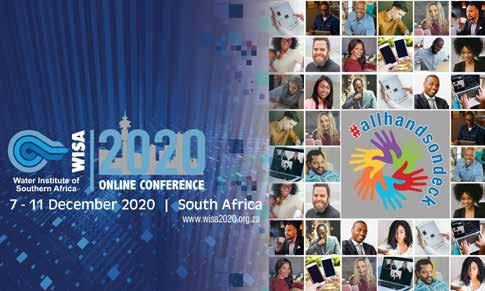
7 minute read
AllHandsOnDeck for water and sanitation
The WISA 2020 Conference & Exhibition took place as a virtual conference from 7 to 11 December under the theme #AllHandsOnDeck.
Speaking to the conference theme, #AllHandsOnDeck, Dan Naidoo, chair of the WISA Board, highlighted the vital need for all local and regional players in both the public and private sectors to work together to address South Africa’s water challenges and implement appropriate solutions.
Advertisement
“We have the skills and technologies needed to address our challenges and must now turn our attention to broadening the discourse in the sector to explore the economic, political and behavioural aspects that govern water and sanitation if we are to implement effective and sustainable solutions.”
To discuss some of the challenges and solutions, several of South Africa’s leading sector professionals participated in a panel discussion facilitated by Professor Mike Muller, technical chair, WISA. The skills gap Dr Allyson Lawless, managing director at SAICE Professional Development and Projects, highlighted the dire need to rebuild South Africa’s technical skills base. Between 2005 and 2015, the number of public sector employees has grown significantly, and is now largely dominated by younger people. “We have lost large numbers of engineers and older people,” said Lawless. The result is limited scheduling of maintenance, limited capacity to address increased challenges due to Covid-19, limited long-term planning, inadequate input by engineers into the budgeting process, limited in-house expertise, limited time available for senior staff to train juniors, and a loss of institutional knowledge, systems and processes.
Despite water services being complex and highly technical, there are very few engineers in place and much of the
work is being done by young people with little experience in running water service institutions. “There needs to be a recognition by government of the need for technical skills,” Lawless stressed.
She highlighted that, despite spending millions on training engineering graduates, there are no posts available to employ them and management posts in technical departments are frequently filled with non-technical people. Furthermore, technical staff have limited authority and do not have the opportunity to input on budget, supply chain and management issues.
Lawless called for an end to overbearing procurement legislation, restrictive OSD (occupation-specific dispensation), water losses, non-payment, political interference, and corruption. We must rebuild technical structures with urgency and implement infrastructure-friendly procurement. To achieve this, she called for institutes like WISA, IMESA and SAICE to lobby government for change.
The municipal challenge Neil Macleod, former head: Water and Sanitation at eThekwini Municipality,
DIDN’T ATTEND WISA 2020?
You can still register and watch all the presentations on-demand until 31 May 2021.

To register, visit wisa2020.org.za.
pointed out that municipalities, which are the face of water and sanitation, are contributing to an incapable state.
The 2018 Municipal Strategic SelfAssessment (MuSSA) paints a desperate picture of the state of local government, which resultantly struggles to attract skilled professionals. The MuSSA showed that 40% of water services authorities (WSAs) are extremely vulnerable, 38% are highly vulnerable, and only 6% are functioning properly. Some did not even realise how vulnerable they were, and most are heavily dependent on capital funding from national government. More than half of WSAs collect less than 70% and have high levels of nonrevenue water.
“Behind all of this is the fact that the management capacity is just not there,” said Macleod, echoing Lawless’ sentiment. He stressed the need to have older experts to mentor and train young professionals to create efficiencies and the environment that is needed.
In addressing corruption, Macleod was encouraged by Minister of Cooperative Government and Traditional Affairs Nkosazana Dlamini Zuma’s recent announcement that people who hold office in political structures can no longer work for local government. “That is the first small step, but we need far more severe actions to create the separation between political oversight and executive management.”
Macleod stressed the need to create viable institutions. “Having 144 WSAs to me does not make sense, especially when the MuSSA shows that many of them are not viable.” He argues that we should consider cutting the number of WSAs to 50 or fewer and locate their head offices in towns where people want to live.
Lastly, he emphasised a need for management contracts to bring in the private sector to create systems and train staff, as was done at Johannesburg Water, which was turned around in under five years. “We need to do things differently,” he stressed.

The new model Dhesigen Naidoo, CEO, Water Research Commission (WRC), pointed out the need to think about future human capital in a different way. Although there has been a decrease in expertise, Naidoo believes the increase in the number of young people entering the sector is very positive in that they have a newer view of the world and how the future economy should operate.
“There needs to be an injection of mentorship, and there are models that show us how this can work,” he said. In 2011, around 70% of the WRC’s projects had leaders who were older white males. Today, this has shifted to 80% previously disadvantaged individuals without altering any of the quality criteria. “We just made a much higher investment in capacity building and training, and we brought in the older folk to be mentors in the system. It’s working really well,” said Naidoo.
He also identified a need for a vastly expanded water team that extends beyond technical and scientific knowledge to include behavioural, social and financial acumen to organise water security into the future.
The master plan Trevor Balzer, acting director general, Department of Water and Sanitation (DWS),
spoke to the National Water and Sanitation Master Plan (NW&SMP), which seeks to avoid a water deficit that could grow to 17% by 2030. He highlighted South Africa’s many backlogs and challenges that must be urgently addressed to achieve water security. These include insufficient infrastructure investment, inadequate management of water resources, increasing levels of pollution, and a lack of skills.
The NW&SMP outlines seven areas of priority, namely: 1. Immediate institutional change to get back on track on the road to water security 2. Planning and infrastructure investment to address the country’s strategic water challenges 3. Information to improve performance and support sustained, inclusive development 4. Transforming the water sector 5. Ensuring financial sustainability 6. Legislative review 7. Protection and restoration of ecological infrastructure. Balzer is assigning champions to drive each of these seven areas.
“While the Covid-19 pandemic has had a severe impact on the country’s economy, and despite the constraints on budget availability, the implementation [of the NW&SMP], I believe, will help enable a coordinated recovery regarding basic services for the benefit of public health and hygiene, food security, and socioeconomic development in general,” he said.
He also expressed a desire, shared by Minister Lindiwe Sisulu, to create a reserve force of retired engineers that can be called on to assist the DWS in areas of need.
Moving forward A position paper and pledge for action will be drawn up and shared with the sector based on the outcomes of the conference.
“Our past conferences have provided a platform to discuss the problems and solutions facing the water and related sectors. Now is the time to create mechanisms and an enabling environment to set us on a path of implementation and impact,” said Dr Shafick Adams, chair: LOC, WISA 2020.
“Water is everyone’s business, and everyone should be involved in ensuring we have water security. This is more important than ever, as we need to navigate issues of pandemics, climate change, weather variability, demand growth, infrastructure needs and more.”

STUDENT AWARDS
To encourage student participation and reward postgraduate research excellence, the South African Young Water Professionals (YWP-ZA) presented an award for the best student presentation at WISA 2020. Webster Magowo, PhD student at the University of the Witwatersrand, took first place for his research topic, ‘Co-treatment of acid mine drainage and Fischer Tropsch wastewater using dissimilatory sulfate reduction.’ He received a cash prize of R3 000 and free registration for the next WISA conference. First runner-up went to Alice Harvey, MSc Eng student from the University of Cape Town. The second runner up was Leny Letjiane, MEng Chem student at Tshwane University of Technology, and the third runner-up Craig Tanyanyiwa, PhD student at the University of Cape Town. Tanyanyiwa also received the award for the most popular student presenter. “Congratulations to all the student winners – YWP-ZA celebrates your achievement,” said Ashton Busani Mpofu, national lead, YWP-ZA. “We know that postgraduate studies can be challenging, particularly in times like these when the world is plagued by the novel coronavirus pandemic. The outcomes of your research work can be developed, demonstrated and commercialised. Research, development and innovation are key in achieving SDG 6, growing the economy, and reducing youth unemployment.”











